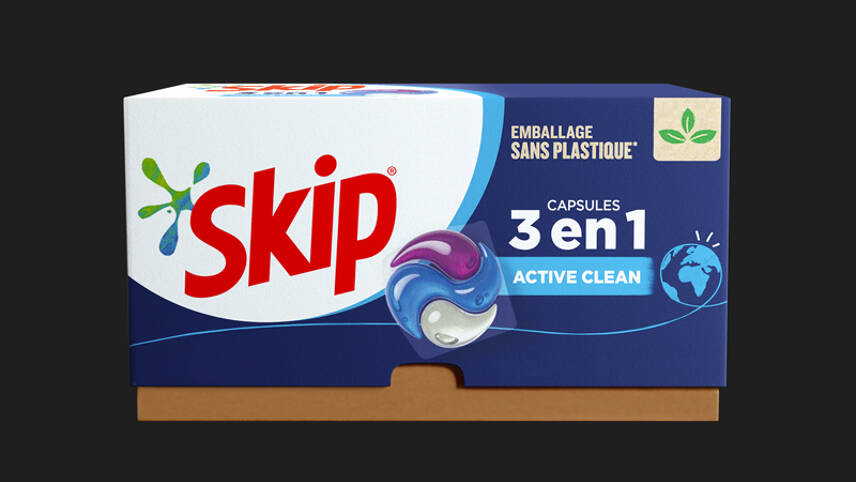Register for free and continue reading
Join our growing army of changemakers and get unlimited access to our premium content

The capsules will go on sale in France first, this September. A Europe-wide rollout is then planned in early 2023
The FMCG giant has stated that developing the innovative capsules has required extensive collaboration internally and externally, with teams working on issues like materials science, procurement and packaging manufacture.
In terms of packaging, the capsules are being housed in plastic-free boxes which consist solely of cardboard components. The cardboard is being sourced from recycled and FSC-certified feedstocks. Unilever is forecasting that the packaging will mitigate the use of 6,000 tonnes of plastic per year, replacing rigid plastic boxes on its Persil, Skip, OMO and Surf Excel brands.
The capsules are also an example of Unilever’s approach to removing all carbon derives from fossil fuels from cleaning and laundry products – an ambition it announced in 2020 and is aiming to deliver in full by 2030. 65% of the ingredients used to make the capsules are based on carbon derived from plant sources, including the membrane.
Changing the membrane, Unilever claims, will make the capsules more effective in short and cold wash cycles. Consumers will be made aware of this and encouraged to opt out of long cycles of 40C or more where possible.
Overall, Unilever has calculated that the lifecycle greenhouse gas emissions generated by the next-generation capsules is 16% lower than their predecessors. Reductions are being delivered in the consumer use phase of the product as well as in manufacturing.
The capsules will go on sale in France this September. They will then be rolled out across Unilever’s other European markets in early 2023.
Unilever Home Care’s global head of innovation Dr Keith Rutherford said that the amount of “research, development, and manufacturing skill that is required” to develop products like the new capsules “shouldn’t be underestimated”.
Last month, Unilever partnered with American bioengineering firm Genomatica in a bid to develop and scale sustainable alternative materials to replace palm oil and fossil fuel derivatives in cleaning products. The partnership has jointly pledged $120bn to the initiative and are looking for other businesses to join the collaboration.
Estee Lauder Companies
In other sustainability innovation news from the corporate space, Estee Lauder has selected the two US-based projects it will fund through its ‘Sustainability Challenge’ scheme, which it operates in partnership with the International Space Station. Up to $1m will be provided to the two projects to help trial them and add them to the space-based lab.
One of the projects is studying the behaviour of enzymes that have been found to have the ability to break down plastics into their component polymers. Spearheaded by Dr Katrina Knauer, the project has backing from the US Department of Energy’s multi-stakeholder BOTTLE (Bio-Optimised Tech to keep Thermoplastics out of Landfills and the Environment) consortium and Colorado’s National Renewable Energy Laboratory. It will assess whether plastics processed in this way could be added to plastics recycled using other methods, as well as looking at whether different levels of gravity and radiation influence the behaviour of the enzymes.
Also securing backing under the Sustainability Challenge is a project seeking to improve carbon removal technologies involving the use of porous ‘aerogels’ – semi-liquid chemical solutions which can pull CO2 from the air. The resulting captured carbon could be used to replace oil as a feedstock for plastic production. This project, spearheaded by Dr Stephen Meckler, is based out of California’s Palo Alto Research Centre, which is operated by Xerox.
“As an evolution of our commitment to long-term sustainability and our partnership with the ISS National Lab, we’re honoured to recognise and facilitate the impactful research of Dr. Meckler and Dr. Knauer,” said Estee Lauder’s global brand president Stéphane de La Faverie. “Building on the visionary work of our namesake founder Estée Lauder, who redefined technology and innovation in beauty, we are championing the next generation of leaders in science to help drive the achievement of our sustainable packaging goals at Estée Lauder and have broad impacts beyond our industry.”
Estee Lauder’s packaging goal is to ensure that at least 75% of its packaging portfolio is recyclable, refillable, reusable, recycled or recoverable by 2025, aiming for 100%. This is less ambitious, perhaps, than goals set through initiatives like the WRAP UK Plastics Pact, which require full reusability or recyclability of all packaging – regardless of how much recycled content it contains.


Please login or Register to leave a comment.